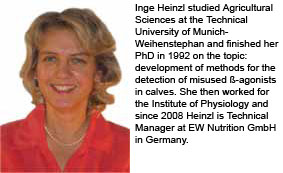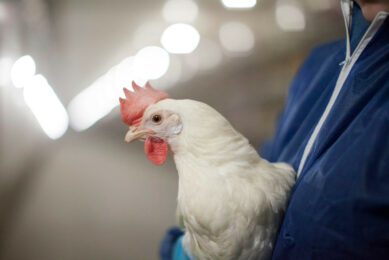Egg powder gives calves boost

During the first weeks after birth, calves are often infected with pathogens that cause diarrhoea and may lead to death.If the calf overcomes the disease, resulting weakness reduces growth on the long-term. Antibodies from hen eggs could help to strengthen the immune system and increase the resistance to such diseases. By Dr Inge Heinzl.
By Inge Heinzl
Young animals are protected against diseases by specific antibodies provided by their mother (passive immunity) or by those they produce themselves after contact with a pathogen (active immunity). Cows have a multi-layered placenta that prevents the transfer of maternal antibodies to the calf in the womb during pregnancy. Therefore, the intake of antibodies from colostrum shortly after birth is of paramount importance. During the first 24 hours after birth, antibodies can pass through the intestinal wall intact. Afterwards, the concentration of antibodies in the colostrum decreases rapidly and so does the permeability of the intestinal wall. The young animal therefore only gets an ‘immunological starter kit’. Afterwards it has to build up its own – active – immunity.
Weak points
The calf passes two periods of insufficient immunity: the first shortly after birth, the second at 4 to 7 weeks. This is because its passive immunity decreases faster than its’ own, active immunity, is developed. This, even under optimal conditions, particular low state of immunity can worsen if the intake of colostrum is insufficient or consumed by the calf too late (due to difficulties during parturition, bad management, etc.) or if the cow cannot provide a colostrum with a sufficient content of immunoglobulins (recently arrived cows with a very short time of adaptation, high initial milk yield, etc.). If the calves are additionally stressed by moving or change of feed, pathogens find ideal conditions to cause disease in the young animal. The consequences are diarrhoea, lower performance and losses due to mortality.
Egg antibodies
In the past all farm animals were kept together. Therefore the hens were in contact with all pathogens appearing on the farm. They did not necessarily show symptoms of the disease but produced antibodies against the pathogens. Unlike mammals, hens only have a single chance to give immunological support to their chicks during the first days of life, and that is the egg. Eggs contain antibodies against diseases the hens have been challenged with and as such this is completely natural! In earlier times farmers often used this natural phenomenon in practise by feeding eggs to weak and ill animals to strengthen their immune system. This traditional and well proved method is now being used in a modern form. Commercially raised hens are hyper-immunized against pathogens that normally cause diarrhoea in calves. The eggs produced contain high levels of antibodies specific against these particular pathogens. The resulting egg powder is a highly potent feed supplement providing calves with additional and effective protection against diarrhoea during the first weeks of life.
Antibody mode of action
First, let’s consider the mode of action of antibodies in general. Antibodies recognise a foreign particle (pathogen, antigen) because of its structure. Frequently, the whole structure is not necessary for recognition, as only parts can be sufficient. Antibodies act very specifically in a lock and key system. Egg antibodies (IgY) have a high binding capacity and act mainly in the gut.
They also have a high potency in identifying the pathogens. In the case of E. coli, for example, the fimbria, which are responsible for binding to the intestinal cell wall, are recognised and blocked. The resulting harmless pathogen-antibody combination is then eliminated with the faeces.
Scientific studies
Several field and scientific studies have been conducted to confirm the effectiveness of egg antibodies (Ehrhard et al., 1993, Ikemori et al, 1992; Ikemori et al. 1997, Kuroki et al., 1994, Oltmer, 1998). A trial carried out in collaboration with the University of Munich (Germany) and the Universities of Istanbul and Bursa (both in Turkey) showed a decrease of diarrhoea incidence from 38.8% to 14.3% in calves fed with hyper-immunised egg powder*. Mortality declined from 8.8% to 0% (Figure 1). In a study carried out in Japan a decrease of necessary treatments could be seen in the egg powder group. More than half of the animals of the group receiving egg powder didn’t need any treatment and another 16 % were only treated once. By contrast, in the control group more than half of the animals had to be treated more than four times. It was concluded that the feeding of hyper-immunised egg powder lead to a higher percentage of healthy animals. Feeding of egg powder not only means prevention of negative but also enhancement of positive effects. Several trials in different countries showed an increase of daily gain (e.g. Kuroki et al., 1994). In Figure 2 a University trial in Germany is shown. The trial (Dusel, 2007) demonstrated an increase of daily gain from 14 to 22 % (depending on the trial period).
*The egg powder containing specific antibodies (product name: Globigen®) used for the trials was provided by EW Nutrition GmbH, Visbek, Germany.
Source: FeedMix vol 17 nr 6, 2009











